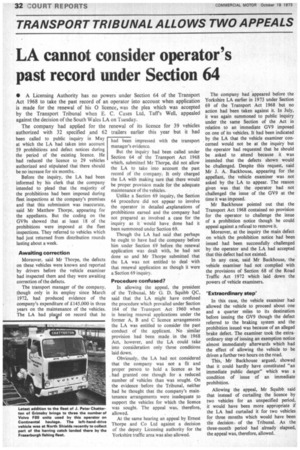LA cannot consider operator's past record under Section 64
Page 34

If you've noticed an error in this article please click here to report it so we can fix it.
• A Licensing Authority has no powers under Section 64 of the Transport Act 1968 to take the past record of an operator into account when application is made for the renewal of his 0 licence, was the plea which was accepted by the Transport Tribunal when E. C. Cases Ltd, Taff's Well, appealed against the decision of the South Wales LA on Tuesday.
Before the inquiry, the LA had been informed by his clerk that the company intended to plead that the majority of the prohibitions had been imposed during fleet inspections at the company's premises and that this submission was inaccurate, said Mr Matthew Thorpe, appearing for the appellants. But the coding on the GV9s showed that at least 18 of the prohibitions were imposed at the fleet inspections. They referred to vehicles which had just returned from distribution rounds lasting about a week.
Awaiting correction Moreover, said Mr Thorpe, the defects on these vehicles were known and reported by drivers before the vehicle examiner had inspected them and they were awaiting correction of the defects.
The transport manager of the company. though only in its employ since March 1972, had produced evidence of the company's expenditure of L145.000 in three years on the maintenance of the vehicles. The LA had plased on record that he
had been impressed with the transport manager's evidence.
But the inquiry had been called under Section 64 of the Transport Act 1968 which, submitted Mr Thorpe, did not allow the LA to take into account the past record of the company. It only charged the LA with making sure that there would be proper provision made for the adequate maintenance of the vehicles.
Unlike a Section 69 inquiry, the Section 64 procedure did not appear to involve the operator in detailed .explanations of prohibitions earned and the company had not prepared as involved a case for the inquiry as it would have done had it been summoned under Section 69.
Though the LA had said that perhaps he ought to have had the company before him under Section 69 before the renewal application was dealt with, he had not done so and Mr Thorpe submitted that the LA was not entitled to deal with that renewal application as though it were a Section 69 inquiry.
Procedure confused?
In allowing the appeal, the president of the Tribunal, Mr G. D. Squibb QC, said that the LA might have confused the procedure which prevailed under Section 164 of the Transport Act 1960 when in hearing renewal applications under the former A. B and C licence arrangements the LA was entitled to consider the past conduct of the applicant. No similar provision had been made in the 1968 Act, however, and the LA could take into consideration only those conditions laid down.
Obviously, the LA had not considered that the company was not a fit and proper person to hold a licence as he had granted one though for a reduced number of vehicles than was sought. On the evidence before the Tribunal, neither had he thought that the company's maintenance arrangements were inadequate to support the vehicles for which the licence was sought. The appeal was, therefore, allowed.
At the same hearing an appeal by Ernest Thorpe and Co Ltd against a decision of the deputy Licensing authority for the Yorkshire traffic area was also allowed. The company had appeared before the Yorkshire LA earlier in 1973 under Section 69 of the Transport Act 1968 but no action had been taken against it. In July, it was again summoned to public inquiry under the same Section of the Act in relation to an immediate GV9 imposed on one of its vehicles. It had been indicated by the LA that the vehicle examiner concerned would not be at the inquiry but the operator had requested that he should be asked to attend because it was intended that the defects shown would be challenged. Despite this request, said Mr J. A. Backhouse, appearing for the appellant, the vehicle examiner was not asked by the LA to appear. The reason given was that the operator had not challenged the issue of the GV9 at the time it was imposed.
Mr Back house pointed out that the Transport Act 1968 contained no provision for the operator to challenge the issue of a prohibition notice though he could appeal against a refusal to remove it.
Moreover, at the inquiry the main defect on which the prohibition notice had been issued had been successfully challenged by the operator and the LA had accepted that this defect had not existed.
In any case, said Mr Backhouse, the vehicle examiner had not complied with the provisions of Section 68 of the Road Traffic Act 1972 which laid down the powers of vehicle examiners.
'Extraordinary step' In this case, the vehicle examiner had allowed the vehicle to proceed about one and a quarter miles to its destination before issuing the GV9 though the defect referred to the braking system and the prohibition issued was because of an alleged brake defect. The examiner took the extraordinary step of issuing an exemption notice almost immediately afterwards which had the effect of allowing the vehicle to be driven a further two hours on the road.
This, Mr Backhouse argued, showed that it could hardly have constituted "an immediate public danger" which was a condition of issue of an immediate prohibition.
Allowing the appeal, Mr Squibb said that instead of curtailing the licence by two vehicles for an unspecified period, it would have been more appropriate if the LA had curtailed it for two vehicles for three months which would have been the decision of the Tribunal. As the three-month period had already elapsed, the appeal was, therefore, allowed.








































































































